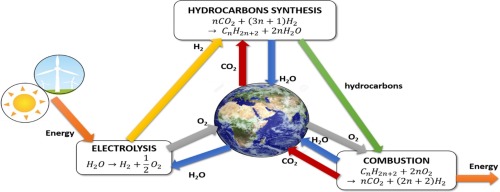Journal of CO2 Utilization ( IF 7.2 ) Pub Date : 2020-02-25 , DOI: 10.1016/j.jcou.2020.02.009 Carlotta Panzone , Régis Philippe , Alban Chappaz , Pascal Fongarland , Alain Bengaouer

|
In the framework of limiting the concentration of CO2 in the atmosphere, the utilization of CO2 as a feedstock for the synthesis of different products, such as methanol, dimethyl ether and liquid fuels, is gaining a lot of interest. In particular, the Power-to-Liquid (PtL) concept which combines the CO2 hydrogenation with the production of hydrogen from water electrolysis, powered by renewable sources, seems a very interesting solution for the production of liquid fuels and chemicals. It also represents a storage solution for the intermittent renewable energies. In this work, the techno-economic feasibility of the CO2 hydrogenation into long-chain hydrocarbons, compared to the synthesis of other liquid or gaseous products (methanol, DME, hydrogen, methane…) is studied, as well as that of PtL compared to other renewable fuels production pathways. Even if the PtL process is not economically competitive on the market yet, some economic considerations predict a decrease in the production cost of PtL fuels, thus it is worth to study the synthesis of liquid fuels from CO2 and H2 for its several advantages in terms of efficiency and sustainability of the process, especially for middle or long term prospects and for their potential applications as fuel for the heavy-duty, marine and aviation transport, but also as feedstock for the chemical industry. The review is then focused on the hydrogenation of CO2 into liquid fuels. A review of the performances of Fe and Co catalysts is also given, pointing up that iron catalysts are more suitable for the production of long-chain hydrocarbons, especially when potassium-promoted. A state-of-the-art about the kinetic modeling of the reaction and the current industrial demonstrators has also been reported. However, very few data are available and further investigation in this field should be done. This work, summarizing general information about the hydrocarbon synthesis from CO2 hydrogenation, shows the complexity of such a process and points out that further studies about the reaction mechanism, kinetics and the development of a highly active catalyst selective towards long-chain hydrocarbons are needed. This will help to increase the techno-economic feasibility of this challenging process.
中文翻译:

动力转化为液体的催化性CO 2增值成燃料和化学品:集中于费托路线
在限制大气中CO 2浓度的框架中,利用CO 2作为原料来合成不同产物,例如甲醇,二甲醚和液体燃料,引起了人们的极大兴趣。尤其是,将CO 2加氢与由可再生能源驱动的水电解制氢相结合的动力转化为液体(PtL)概念似乎是生产液体燃料和化学品的一种非常有趣的解决方案。它还代表了间歇性可再生能源的存储解决方案。在这项工作中,CO 2的技术经济可行性与其他液态或气态产物(甲醇,DME,氢气,甲烷……)的合成相比,人们研究了加氢成长链烃,与其他可再生燃料的生产途径相比,对PtL进行了研究。即使PtL工艺在市场上不具有经济竞争力,一些经济考虑因素仍预测PtL燃料的生产成本将下降,因此,值得研究由CO 2和H 2合成液体燃料的几个优点。流程的效率和可持续性方面,特别是对于中长期前景以及它们作为重型,海洋和航空运输的燃料以及化学工业的原料的潜在应用而言。然后,我们将重点放在一氧化碳的加氢上2成液体燃料。还回顾了铁和钴催化剂的性能,指出铁催化剂更适合于生产长链烃,尤其是在钾促进下。还已经报道了有关反应动力学模型和当前工业证明的最新技术。但是,几乎没有可用的数据,应该在该领域进行进一步的研究。这项工作总结了有关从CO 2合成烃的一般信息加氢表明这种方法的复杂性,并指出需要进一步研究反应机理,动力学以及对长链烃有选择性的高活性催化剂的开发。这将有助于增加这一具有挑战性的过程的技术经济可行性。











































 京公网安备 11010802027423号
京公网安备 11010802027423号